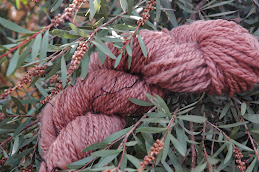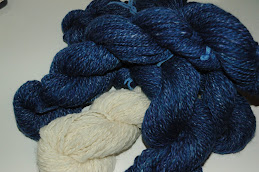SOME hanks of yarn are in my stash for no reason other than their beauty.
Others were irresistible because of their texture.
Like most textile fanatics my stash tends to overrun my work space, making it hard to find what I am looking for and creating tension in what should be a serene place.
Looking around my ``loom room'' I can think of many good reasons for culling the stash.
Fashions and colours change. Flip through a pattern book from a decade ago and the colours and patterns look quaint. That to-die-for jacket looks so-last-year, or worse last-century.
On the other hand, a stash builder always has yarns on hand when the shops are closed and can find that odd shade to finish a multi-coloured jumper or tapestry, even when the colour is way out-of-date.
But my ``loom room'' has reached the stage where I can just move between the accumulated boxes and my loom.
So it is time for a good stash bust.
My usual stash busting strategy is to weave a scarf or two. That's what I have been doing for the past couple of weeks.
For these two scarves I held four warp threads in my hand and wound the warp treating the four as a ``bundle''.
The four yarns (all 100 % wool handspun) were teal, variegated brown, grey/brown and grey/brown multicolour.
The bundles of four threads were randomly threaded in a straight 1234 threading.
Pattern:
Scarf 2: four-shaft twill (12 23 34 14 34 23 12 14).
For the weft, scarf 1 has grey-brown handspun.
For scarf 2 I have used three different wefts - first the pale grey-brown, then the teal, and finally the grey/brown multicolour.
The main reason for this is lack of attention. I was recovering from having my wisdom teeth out and started using the same grey-brown as for scarf 1.
I realised after weaving about a third of the scarf that I was about to run out of weft yarn.
Since the yarn was one I had purchased from the Victorian Handweavers and Spinners Guild several years ago it was impossible to buy more.

Rather than waste yarn or time with unpicking, I decided to turn serendipity into a design feature and use three different wefts, in equal proportions.
So the second third uses the teal handspun and the final third features the grey/brown multicolour yarn.
I like the result even if it wasn't intended.
In the past I have shied away from using handspun for warp but these yarns all worked perfectly with no sticking or uneven stretching.
From a distance the first scarf looks brownish. But in the right light the wide range of hues in the multicolour come to life.
That's the best thing about stashbuster scarves - no two are ever the same.
Hint: I use a length of cotton tape marked in inches as a guide when I am weaving a scarf. That is about the only time I use inches rather than centimetres - a legacy of first learning to weave from someone who was more familiar with imperial measurements. I learnt to make the ``ideal'' scarf length and width for most purposes in inches and have continued to do so.
Marking a new tape in centimetres is on my to-do-list, but not near the top.
Happy weaving,
Jan







